#we need queer heroes
Text

i've been working on my overwatch stickers for so LONG that they released a new character before i could finish them, so i speedrun his design, in ouran host club parody
#my art#overwatch#lifeweaver#i'm so close to finishing them i just need to render the tanks!!#and then i can finally re-open my store 🥹#we're finally getting a southeast asian hero and he's queer#SEAn gays we are winning everyday
53 notes
·
View notes
Note
no ur so real because im sapphic and i like her music but there are only a few songs of hers that apply to me in a sapphic context and it’s because they apply to ME. people who fr think that she’s writing about her own experiences with women honestly are ruining the listening experience for themselves because why are you thinking about who she’s fucking when you listen. when i listen to music im usually thinking about how it applies to MY life and how it makes ME feel. idk maybe it’s just me😭 there are also many queer artists who make similar sounding music to her that are good places to start actually listening to queer music and they exist within her “sphere.” idk i feel like it’s obvious when someone has an obsession with her being queer versus when they are just listening to her music under a queer lens if that makes sense.
lol yeah i mean obviously queer people can relate to songs by artists who are not openly queer, read in queer subtext, etc…like there r plenty of artists who r not openly queer whose music & work i still relate to through a lens of queerness etc. that being said there are also plenty of openly queer musicians making music about being openly queer….so if im looking specifically for a queer artist or openly queer music. im gonna go 2 them first…like we don’t actually have 2 subsist on crumbs….
#ask#also quite frankly find it a bit insulting that the article was like.#she could be our queer hero if we just let her!!!!!#um. i already have queer heroes who are openly queer why would i need her….
19 notes
·
View notes
Text
lying awake at nigt thinking abt how much better some storylines and themes wouldve been in heroes of olympus if jason had been a girl
#its 2am#anyways imagine the first book in a new series of riordan following the pjo books wouldve featured a woman in jasons spot#think abt jason and pipers romance abt how jason felt like a knockoff percy sometimes how jason and a lot of other things#a few things would need to be changed to accomodate ofc but anyways it wouldve made the story of a ll of heroes of olympus better tbh#also thinking abt how rick made piper queer in toa... we coulsve had it alllll soonerrr#but alas maybe that wouldve been ahead of the time💀#hoo#heroes of olympus#jason grace#piper mclean#riordanverse#my post
12 notes
·
View notes
Text
its so strange and painful and lovely going back to your favorite book as a child and going "ohhh of course this is the story that made me"
#for me its the how to train your dragon books#its about the scrungly little drawings and the magic and the boyhood and the wildness and the outsiderness and platonic love conquering all#and teaching yourself everything worth knowing and overcoming your obstacles with cleverness and kindness not strength and choosing to be#something other than what your family your hometown your tribe is its about platonic love conquering all its about forgiveness its about#building your own family its about needing to get out and see the world and get it under your fingernails its about how we are always more#alike than different its about persevering in the face of all odds its about queerness its about both optimism and compromise#its about extinction its about making the hard decision its about growing up its about becoming a hero the hard way.#vic.txt
5 notes
·
View notes
Text
like idk yall. it just bums me the fuck out how the majority of loz-likers are bigoted normies and like a weird amount of them are moderately-to-born-again christian for some reason too??? what do they see in these games???? with link's birthing hips and babysmooth shaven legs???!!!?!?!??
#my t#i need a main title loz game where link is either a girl#like not 'linkle' either bless her fuckin soul but shes not The Hero#like i need LINK HIMSELF to be she/her#OR we finally get to actually play zelda herself#but i know thats never gonna happen lol#“the most important aspect of the game is zelda being sealed away” right lmao okay sir#put ur crown on and go to sleep princess right okay#idk im just mad about it for like no reason#cause i love these games but holy shit do they make me mad sometimes#link is meant to literally 'link' the player to the game#and im queer so OF COURSE THE WAY I PERCIEVE LINK. IS QUEER.#i need the cishets to sew their mouths actually closed forever#cishet isnt the FUCKING DEFAULT#literally at this point i dont perceive cishet abled neurotypical people as normal. theyre fucking weird to me
1 note
·
View note
Text
I love how we're seeing the different emo bands takes on nostalgia.
Brendon Urie is out there ruining himself 'cause he wants to keep the concept of Panic! At the Disco alive like some violently murdered corpse whose limbs and hair are clipped to the body, now more a memory than a solid thing.
MCR is making fun of just of that, of the way the industry is selling a distorted version of the events of their past. They are mocking the way people expects them to stay frozen on a time when they were miserable, just because that's profitable for the music industry, just because their suffering is entertaining. But MCR won't do that, they won't back down after all they've gone through, after all they have won (because they fought hard for it!), after all the improvement. They have the right to live now, create new things.
Paramore reminded everyone of how that past? The one they so badly want back? That past was full of racism and misogyny and homophobia !!!!!Bands like MCR and FOB and Paramore were not enough because they were too queer or too black or too femenine. They are "heroes of the scene" NOW not because the scene has always loved or embraced them, but because they all refused to disappear, to give up, to give in. The real triumph is for them to enjoy, because now the scene is crying and begging for them to be back (but not them just the image of them) and they can say "fuck you, this is for my bandmates and the fans!".
And now FOB is back, with Pete Wentz spitting poetry about how nostalgia can be such a strong feeling, but there's more than just it. You cannot stay for the memories to consume you, not when there is so much to see, so much to do, so many details happening right here and now for you to enjoy. You need to acknowledge your past with all it carries and you need to move forward. You can't stop, because nostalgia can and will try to kill you, but why would you let it? Why are we supposed to live from the past? FOB have been called sellouts their whole time they've been here, so why would they listen now to the noise? It's just them, their fans and the people they love on this journey.
I love MCR I love FOB I love Paramore because they won't be used to manipulate the audience into believing the past was better. It was not. Now is better, the future they've made, the future they fought for. Now is theirs and ours. They win now.
3K notes
·
View notes
Text
How We Fall For People Like James Somerton
We're all joking, but this James Somerton thing has me really fucked up.
I wasn't a huge fan of James. I saw a few of his videos and liked them. In the ones I saw he was calm and explained things straightforwardly and even the one or two times he said things against white women...well, that's language I've been seeing on Tumblr since I joined back in my tweenage years. I thought it was just a dismissive joke pointing out a frank reality.
I didn't watch him too much. Just a few videos. I kept meaning to watch more, but I didn't because sometimes I wanted something easier. But I regarded him sell because of how informed he seemed.
And that's the thing, isn't it? He SEEMED informed. He spoke confidently and sometimes quoted queer sounding articles and I trusted him blindly. And why? Because he was giving me information that SEEMED well researched.
Illumanaughtii too. I WAS a consistent fan of hers before other youtubers came out. Because she presented information really well and I like hand drawn characters and because she read academic sounding quotes. I trusted her and her information was stollen. And I feel like a fool for ever having trusted her now, but at least her stollen facts were apparently accurate. Maybe.
James though, he straight up lied. Todd in the Shadows went through a lot of effort to expose those lies. He did so much research that I didn't bother to do. And he admitted he only did it because he happened to know people more informed than him that noticed the lies and went down a rabbit hole.
And maybe if I was more involved I would have noticed. But that's beside the point. what's getting me is I didn't bother to check myself, I just blindly trusted.
And the worst part is I can see why it happened.
I work.
I work, and then I get home, and when I get home I stress. I stress about work I have to do tomorrow, or classes, or finding a new job that actually pays a livable wage. And to escape that stress I go online to AO3, or tumblr, but especially Youtube.
Because I like youtube, I like to have noise in the background while I work. I like to listen to things while I read. And some of the time it's ASMR videos, or watching someone cook something. But mostly? It's history things or video essays.
And when I'm working, or reading, I'll hear a fact, and I'll look up, and I'll think "Huh, that's interesting to know, I didn't know that." And I won't think anything about it.
Because I'm busy, or I'm tired. I'm tired from work, and I don't want to do more work. Or sometimes it's mental health. This is my coping mechanism. I'm trying to learn things, do something to distract myself. I'm not looking to disprove things.
In other words I'm lazy. Or, if I'm being kind to myself, I'm tired.
Maybe if the topic was something I was an expert in I would have noticed. I'm a former ballerina, I'm a failed history major dropout. Maybe if he'd said something like "Holodomor never happened" or "Boudica is a Finnish folk hero" I'd have noticed. Maybe.
But he didn't, and I didn't notice. I assumed he did the work, and why?
Because surely a gay man wouldn't spend hours on youtube talking about Queer history if he wasn't passionate. Because he, a queer man, would surely know about queer history. Surely he wouldn't want to spread lies and hate. And he's quoting from books and articles so why wouldn't I trust him?
My trust was blind and unfounded.
And now I'm reeling from that. I'm reeling because I'm starting to feel like I can't trust a lot of people. How can I listen to any Youtuber casually now?
I can't, I never should have assumed I could.
Now every informative video feels like I need to do tens of hours of research just to be sure what I'm hearing is true. I feel like I can't trust anything unless I do.
James Somerton took my trust.
And it's not only that either. That's not what scares me the most. It's that there are THOUSANDS of people like me. Millions like me. Who are learning something from a video or a tweet or a tumblr post from someone they assume is an expert and are blindly trusting because they assume they can trust it. They don't intend to do their own research because they're tired, or don't know how. And that scars me. I was a history major, I studied tyrants and misinformation and the rise of propaganda, and I, with all my tools to notice, was still blind.
You cannot blindly trust a video, you cannot blindly trust a tweet, you especially cannot blindly trust a tumblr post.
YOU ARE NOT IMMUNE TO PROPOGANDA
999 notes
·
View notes
Text
I remember thinking, “I wish I could live in a world where Mike and Will could fall in love for real, be real” back in season two and three.
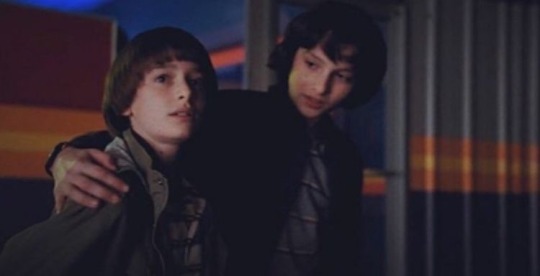
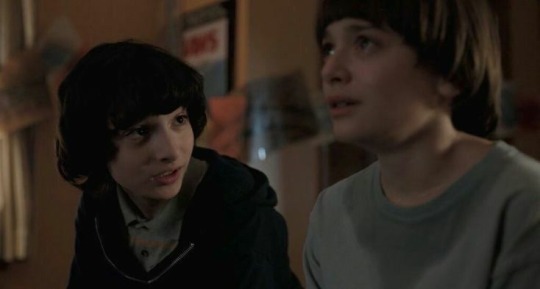
Like I actually remember THINKING that. I remember the real ache, the sadness and loneliness of knowing that gay people, especially gay children, are seen as alien, morphed, distorted, wrong. They don’t want to see us on their screens. It doesn’t matter that we were queer children and we were real, that we had the crushes and the heart fluttering and the falling in love and the wanting just like they did. We are wrong to them. ‘Other’, even when we really aren’t.

So of course Mike and Will would never be shown in a story of falling in love with each other. Perhaps, maybe in a distant dream sort of way, will will be cruelly made to fall in love with a Mike who could never love him back. Maybe the kid who’s been kidnapped, starved, possessed, haunted, and abandoned will be gay because he’s already different, already other - but then we’d have to watch Mike wheeler, the main hero boy of the show, reject him. Because of course it would be rejection, anything else would be unfathomable; the main hero boy falls in real love with the main girl, the center of attention; the main hero boy goes through trials and tribulations, learns courage, and beats odds. He does not fall in love with another boy. He does not fall in love with the starved boy, abandoned boy, haunted boy. Not in this story. Not in any story. Of course not. That’s ridiculous, unthinkable, on a show this massive and known and loved, there is no way they will show us up there, cracked open and bare and bleeding love like they do. It just doesn’t happen, and hasn’t happened, so it won’t happen.

And now we’re here, on the precipice of the final season of this grand grand story, and it’s not just a possibility, it’s a likelihood. An ‘all signs point to here’, an ‘all roads lead to this’.
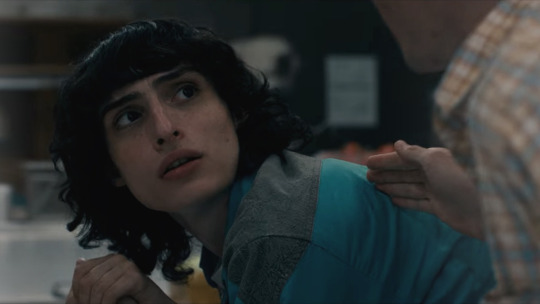

The creators are revving up for the plot twist of a lifetime; a reveal of Mike’s thus far unrevealed internal struggle. it’ll be a cultural reset, a shockwave, a disbelief producing outrage and disgust from some but tears of disbelieving joy, from others. That one of THE biggest shows of all time, created slowly over the course of the better part of a decade, watched and praised and anticipated all over the world… reveals that it was the story of the two main boys falling in love, slowly, the entire time. The cultural whiplash will, I think, be unparalleled.

And yea, obviously maybe we’re wrong about how the story will end. If so, I suppose I’ll delete this when the time comes. But I don’t think I’ll need to. I’m more than excited and proud to be a byler and a stranger things fan in general and I love being on this ride with all of you.
Here’s to the grandest grand finale we can hope for. 🎉 XX
#byler#byler hope#will x Mike#Mike x will#stranger things#st#byler is real#byler positive#byler endgame#byler s5
2K notes
·
View notes
Text
You know how you look back at past shitty connections, friends, family dynamics, and relationships and you're like "I can't believe I let them treat me that way"? I think it hits differently with disability because when you're disabled you don't always even know that you're being mistreated and/or abused in regards to it.
I know statistically disabled people are more likely to be abused but sometimes there's an additional type of abuse that's hard to identify even in hindsight because no one tells you how abusive it is.
But ableist abuse relating to your disability can look like:
Pushing you to do things beyond your limitations despite their awareness of them.
Blaming you for the "inconveniences" brought on by things beyond your control (ex: missing a movie because you had to wait for your pain meds to kick in).
Not allowing you to take breaks or antagonizing you when you do.
Bullying or making fun of things you can't help like gait, a lisp, an embarrassing symptom.
Trying to "cure" or "fix" you, often framing it as "helping" you. Sometimes they look similar and you might be able to tell by their reaction towards lack of improvement.
Holding over you the things they have to do for you (cooking, cleaning, driving, working, etc).
Giving ultimatums that demand things of you that you can't do (getting a job, keeping up with multiple chores).
Using insulting terms, language, and/or slurs that you have not permitted them to or in a context where there is intent to harm you.
Interrogating you about your disability or trying to find discrepancies between your experiences and what they've heard/read/seen about it.
Implying or saying anything along the lines of you faking, being lazy, or exaggerating. Reducing you to a hypochondriac, saying you enjoy being disabled because you seem to like having things done for you, or that you're lazy or abusing them by depending on them for things.
Asking you about it not to learn more, but to use it against you in some way.
Having a martyr complex, acting as if they're a hero for giving you the support you deserve.
Calling you a burden, implying you to be one, or treating you like one.
Acting like you owe them a debt, sometimes even demanding some kind of repayment. Keeping track of money they spend on you that you won't be able to pay back, feeling entitled to things like control, sex, a portion of government benefits, etc.
Self victimizing. They act like you being disabled causes more suffering to themselves than you.
Accusing you of being addicted to your medication. If you genuinely develop an addiction a normal response is concern not rage, finger pointing, etc. if you don't have one baseless claims are very harmful
Trying to force you to stop "depending" on things you need like medication and disability aids
Comparing you to others that are doing "better" than you. Maybe showing you inspiration porn of someone with no legs for example doing incredible things- which is great for them but the "I don't let my disability stop me so you can do anything" shit is harmful. Some of us will get very unwell if we try, and some just can't.
Trying to make others also see you as dramatic, faking, or lazy. Often embarrassing and mocking you as well.
Withholding things you need like medication or disability aids as a punishment
Saying your disability is karma or something inflicted by a divine entity/religious figure. Maybe as punishment for not praying, being queer, or something else they disagree with.
Saying that it's a result of being "promiscuous"/LGBT. For instance if you have HIV or ME/CFS that was a result of something like mononucleosis ("kissing disease").
Shaming you for things related to your disability beyond your control or expressing embarrassment over these things. including but not limited to: appearance (general but also things like say a lupus butterfly rash or weight gain/loss), having to lay down in public (ex: with POTS), inability to keep up with hygiene, etc.
Lacking boundaries and acting as if they are entitled to information or intrusion of your space/belongings due to the power they hold over you and assistance they may provide.
Implying/saying you're living an extended vacation. Maybe one they say they wish they had because they have to do x y z while you "sit around"
Abandoning you solely for your disability (ex: because you can't hang out, they don't want a disabled partner, think you're faking, etc)
Note that someone doing one or two of these things a few times doesn't always mean they're abusing you (also depends on which). It's about the patterns and frequency of this behavior as well as refusal to improve once aware that they're hurting you. People who care about you don't want to hurt you and the normal response is to do their best not to repeat the action that negatively affected you
There are more examples and you can feel free to list some
✨This is about physical illnesses and disabilities, please don't derail✨
#I've experienced most of these unfortunately and it took a long time to identify some of it as abuse#chronic illness#chronic pain#disability#fibromyalgia#cfs#chronic fаtiguе ѕуndrоmе#actually disabled#spoonie#me/cfs#cfs/me#long covid#tw abuse#medical ableism#ableism#cpunk#cripplepunk
218 notes
·
View notes
Text
SandRay are an homage to Wong Kar-Wai's Happy Together and in this essay I will..
...actually explain it because I see people catching his homage's to Western queer media, but not really his shout outs to Eastern queer media.
I assumed there would be allusions to Happy Together when I first saw the trailer, but this last episode centered around Ray really cemented it for me. After all, why would P'Jojo reference all these Western queer shows and not talk about what is probably the most iconic piece of Eastern queer media ever?
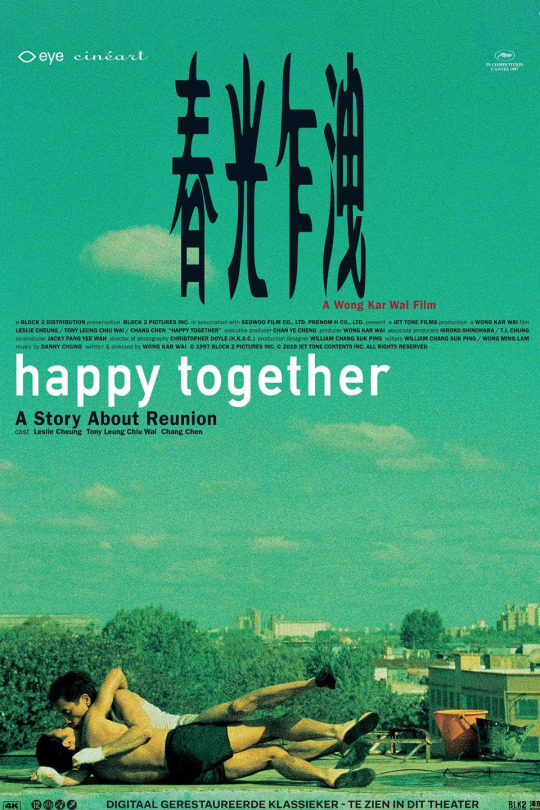
Wong Kar-Wai & Happy Together
For some background information, Wong Kar-Wai is a famous and insanely influential Hong Kong filmmaker. If you're a film nerd, you probably know who he is and recognize his style. If you like film and metas, I would recommend watching some of his stuff because afterwards, you'll realize just how much influence he still has on modern media, especially in Asia. Stylistically, he's known for rich color grading; thematic usage of music; an unending sense of nostalgia, heartbreak, and missed opportunities; and dialogue that mean nothing on the surface because everything meaningful is boiling just under, left unsaid (If you've watched Everything Everywhere, All At Once, the entire actress universe sequence was an homage to Wong Kar-Wai). His actors always do a phenomenal job because so much of what they need to portray can't be communicated through words. It makes sense why SandRay, aka FirstKhao, were chosen to represent Happy Together as they are the strongest actors out of the group.
Happy Together, simply summarized, is about two men, Ho Po-Wing and Lai Yiu-Fai, who are in a very tumultuous relationship. They end up in Argentina because they wanted to visit the waterfall that's on a lamp that they own. They get lost, end up using all their money, and have to figure out a way to get back to Hong Kong. While there, they break up, get back together, and break up again.
The movie was released in 1997 and is still ranked as one of the best queer movies of all time. The two main characters are played by Tony Leung and Leslie Cheung. You might recognize Tony Leung as Simu Liu's dad in Shang-Chi. Leslie Cheung was in Farewell, My Concubine, and was famously a bisexual man with a long term male partner. This is significant because it was virtually unheard of to be out and open at that time (he made his relationship public in 1997 though he had mentioned bisexuality in earlier years), especially in Hong Kong which was, and still is, very homophobic. Leslie received a lot of hate for his sexuality and androgyny. (If you're interested in learning more about Leslie as a queer Asian figure, this is a good video essay that goes over his work and his life).
Sand as Lai Yiu-Fai
Fai's, and in turn Sand's, character can be summed up by one line, "One thing I never told Ho Po-Wing was that I didn't want him to recover so fast. Those were our happiest days."
Both Fai and Sand are very static, straightforward characters. They stay above board for the most part and work a variety of jobs to survive. They have their morals about what is right and wrong, which unfortunately is both of their downfalls.
In Happy Together, Wing breaks up with Fai because he is bored with the relationship. He basically says, "I'm bored being with you. Let's break up. If we happen to meet again, we can try again." Then he leaves Fai stranded on the side of a highway.
Later, he reappears in Fai's life. The first encounter is a fight, much like Sand and Ray's first meeting in the bathroom. The second encounter is because Wing gets beaten up. He goes to Fai because he knows Fai will feel obligated to take care of him and he does. It becomes the beginning of their rekindled relationship.
Similarly, Sand has a strong sense of obligation. There are already metas out there about how Sand has a bit of a hero complex. He sees Ray too drunk to drive and he had to step in. He doesn't just take the keys and order a taxi. No, he takes the keys and drives Ray. Sand sees Ray being all sad and pathetic and he can't stop himself from helping. It makes him feel useful. It makes him feel needed.
Both of these men are caretakers. They show affection by providing care. Sand ends up cooking for Ray just as Fai cooks for Wing even when he's sick. As an added bonus, they both make fried rice.


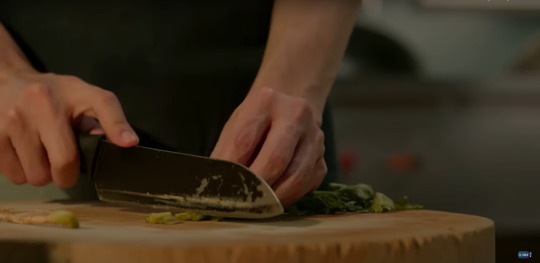
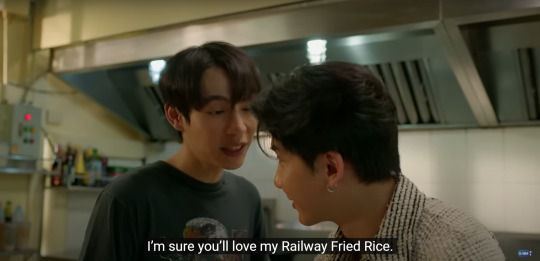
Both Sand and Fai are characters that stand completely still. Ray and Wing always know where to find them. Sand can always be found at YOLO and Fai is at his apartment. Because of this, Ray and Wing come and go as they please. They know that Sand and Fai will take them back...until they finally don't.
Ray as Ho Po-Wing
Starting on a base level, both characters are bratty, needy, promiscuous, spoiled, and selfish. But most importantly, they both share a love of fluffy cardigans.

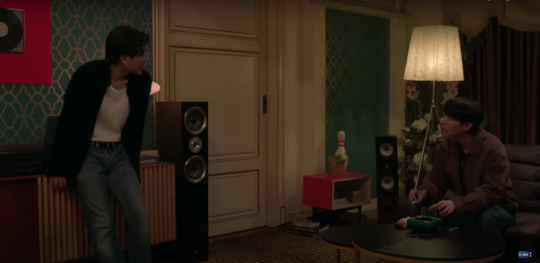
(I also have a theory they keep putting Ray in wife beaters as an homage to the 90's HK cinema style because otherwise...I just don't understand why, as a rich asshole, he's always in wife beaters. By Thai BL logic, he should be in shirts with too many buttons unbuttoned.)
Wing and Ray are both the ones controlling the pace and direction of the relationship. They come when they need someone to nurture their wounds, both physically and metaphorically. They leave when they're bored or have things they deem more important. They both initiate intimacy and won't take no for an answer.


Wing does this by first trying to join Fai on the couch and then chasing after him to the bed and begging him to let them sleep together.
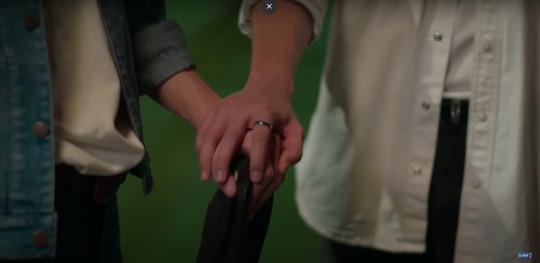
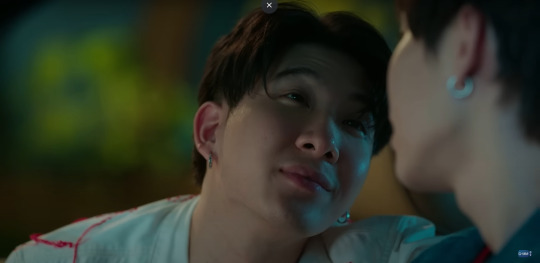
Ray does it by continuously getting Sand to get in the car with him and then using his puppy dog eyes.
They are both also very, very pouty.
Wing's line is "We could start over". He says it every time he comes back after he's the one that ends the relationship. Fai always fights taking him back, but he always does it anyway.
Ray doesn't really have a line yet (unless you count his "na na naa~"s) but he bats his eyelashes and so far Sand has given into him every time. Sand keeps trying to set boundaries, but the moment Ray begs a little bit, Sand crumbles like a house of cards and lets Ray have whatever he wants.
Relationship Parallels
Wong Kar-Wai is known for making movies about star crossed lovers who are meant for each other, but aren't meant to be together.
Like Wing and Fai, Sand and Ray fill in each other's cracks in a way that complements each other. However, because of the nature of the cracks themselves, them complementing each other is exactly what makes the relationship so toxic. One stays and one goes. One takes and one gives. One is steady and one is flighty.
Most of what I wanted to say about the parallels between their relationships is in the character comparison. What I'm more interested in is the future of SandRay's relationship, especially if they continue to parallel Wing and Fai's in Happy Together.
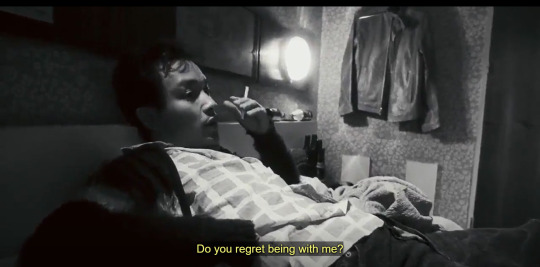



Obviously, Wing and Fai don't end up together at the end. It wouldn't be a Wong Kar-Wai movie if they did. What is interesting is that Fai's relationship with Wing eventually pushes him into becoming something angry and spiteful. Once Wing heals, Fai knows that he'll become bored and want to leave. In an attempt to get him to stay, he steals and hides Wing's passport which is insane because they are both gay men stuck in a foreign country where they don't speak the language.
Wing, of course, leaves anyway.
There is also a third character, Chang, whom Fai ended up liking. These new feelings are what eventually pushes Fai to leave Argentina and move on from Wing and move on with his life.
The question is, if SandRay follows that same path as Happy Together, what will be the passport that Sand tries to hold over Ray and who will be Sand's Chang?
Stylistic Parallels
Smoking
Making Ray and Sand smoke is definitely an homage to Happy Together with the added bonus of being a metaphor. For the most part, we rarely see characters, especially main characters, smoke in Asian media because smoking is reserved for 'bad' characters.
Cigarettes in Happy Together represent boredom. Fai and Wing smoke at the beginning before they rekindle their relationship because they are just moving through life. Once Fai and Wing get back together, cigarettes stop making an appearance. It isn't until their relationship started deteriorating that we see the men smoking again.
This can also be said about Sand Ray's relationship. They started their 'involvement' with cigarettes. However, the last time we actually see them smoking is in ep 2 right before they hook-up. Since then, we have not seen either of them smoking. This probably means that we'll see one or both of them smoking again when their relationship starts to break down.
(In the preview for ep 5, there is an ashtray in the background on the balcony so let's see if Boston finding out about them is a catalyst for them to start breaking down.)
And of course, there is the added homoeroticism of asking for a light.
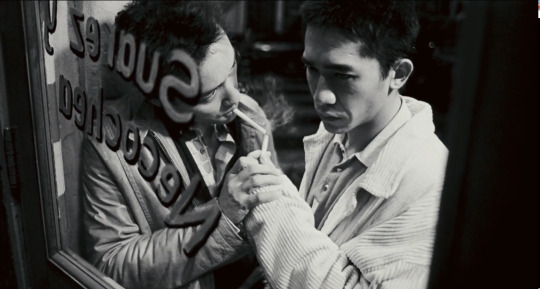

Ray's Opening and Closing Scenes
Ray's episode is really what made me go "I see you P'Jojo".
Ray's episode starts with a shot of him isolated and in emotional pain. The camera is claustrophobically close and it keeps moving around. He has a little voiceover opening. It's calm, it's contemplative, it's a little existential, and it is irrevocably sad. If that is not a Wong Kar-Wai staple, then idk what is. Even the song that starts playing gives me 80s, 90s Cantopop vibes.
Ray talks about how Mew being his emergency contact and the one he goes to. Fai talks about how Wing always comes back to him and says "Let's start over".


The movie and the episode ends with both of them once again isolated, alone. They've been through an emotional journey and they've technically moved on. But there's always the idea of not being able to fully let go in Wong Kar-Wai's movie. So just like how Fai has physically removed himself from Wing, but not emotionally, has Ray actually fully removed himself from Mew?
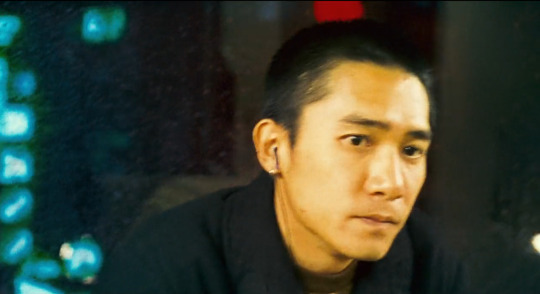

Cinematography
Then there's just a collection of scenes that reminded me very heavily of Happy Together and Wong Kar-Wai's style. I would have added pictures from his other movies for comparison, but Tumblr only lets me put 30 images in a post and I don't want to make a 2nd post.
This scene is specifically from the 1st trailer so I hope they keep it in the show.
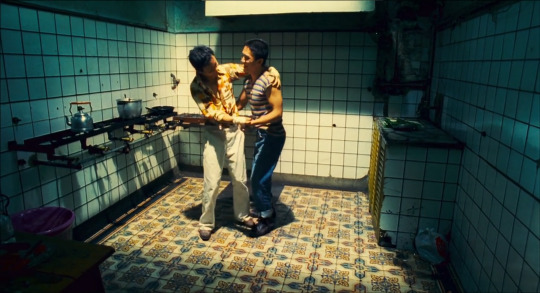

This one I call the inevitability of falling. Both Sand and Fai realize they're fully committed to their decision to take care of Ray and Wing here.


The end title card
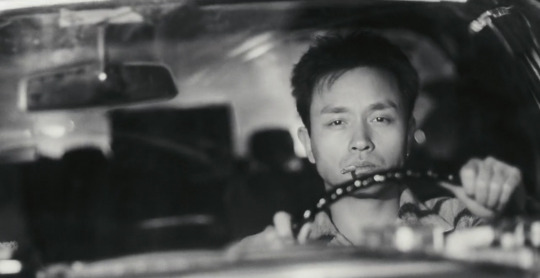

Actually, all of the end title cards give very Wong Kar-Wai vibes. Look at that saturated, neon color grading. Look at the elongated shots. The intense feeling of isolation.


I'm assuming we'll get all the characters at one point, but so far it looks like the end credit cards indicate who the narrator of each episode is.
Anyway, that's it for me! Sorry it was so long and rambling. I tried to organize my thoughts but as I was thinking, more thoughts would pop up and I'd get distracted. If you made it this far, thanks for reading!
#ofts#only friends the series#only friends series#sandray#ofts meta#only friends meta#happy together#i have to post this now because if i dont ill keep writing and ive already spent too much time on this#if anyone has other screenshot comparisons post them#because there are a few more scenes that give me major wong kar-wai vibes#but im too tired to look for them now
422 notes
·
View notes
Text
How To Start Writing A Book (So Says This Idiot)
I’ve been working on my queer superhero fantasy novel Byoldervine for a few years now, but it’s only been in the last year or so that I’ve really dedicated myself to my writing. Now I’ve gone from a fun few concepts to nearly 50K words and counting. So I figured I’d share my process to get here
1. Figure out your barebones concept
Before you can begin writing, you obviously need to know what you’re writing. At this point in time it can literally just be something like “A group of friends go on a quest through a magical fantasy world and meet loads of mythical creatures along the way”, it doesn’t even necessarily need a plot intact. You can be as vague or as specific as you like here, you just need that general idea
2. Figure out your characters
Your characters are the driving forces behind all internal conflict in your story and give your story heart; if you can pick between expanding your plot and expanding your characters, pick the characters. Start figuring out at very least the need-to-know aspects about your characters, such as their motivations and what’s holding them back from achieving them. We can flesh them out more and more as we go
3. Create the main external conflict
Often this takes the form of the main antagonist, but it can be literally anything from a curse the main character is trying to overcome, a series of misunderstandings, a goal they just don’t have the skills to achieve on their own, etc. What’s the thing that’s causing our main character problems they need to overcome?
4. Work out the beginning and end of your story
Where do you want your story to end? Do you want your characters to be living a life of peace and glory as revered heroes after they defeat the villain? Do you want them to be able to return to the life they once had with new friends and stronger powers than ever before? Do you want them to fail and experience the tragedy of their loss? Well if that’s where you want to end, they can’t have all that at the very start of the story, so that’s something that needs to change during the story. Congratulations, you just created a plot point!
5. Use your plot points to create a general plan
Now that you’ve got some ideas of what you want/need to happen during the story, you can make a timeline of these plot points. Say something like “Inciting incident, MC leaves village” or “MC trapped by BBEG” or “MC gains new weapon” or something like that. At this point things are a bit less vague because now you’re starting to see how the plot can go. Don’t forget to add things that the characters would go for, too, even if it’s not plot-relevant
6. Plotting
You’re ready to start plotting by now. For every chapter, write down a general objective of what needs to be achieved within this chapter. Each of these needs to be followed with bullet points of different, smaller plot points within the chapter to achieve this objective. This part I enjoy doing alongside actually writing so I can update it as I go, I’ll usually plot about five chapters ahead and then get to writing until I’ve used them all up
By this point, you’re ready to write! Best of luck and remember that it’s only a first chapter, all it needs to do is exist!
#writing#writers#bookblr#writeblr#book#original#writer#writing advice#how to write#writing tips#writing tips and tricks#on writing#writing ideas
239 notes
·
View notes
Text
In 2006, the year Taylor Swift released her first single, a closeted country singer named Chely Wright, then 35, held a 9-millimeter pistol to her mouth. Queer identity was still taboo enough in mainstream America that speaking about her love for another woman would have spelled the end of a country music career. But in suppressing her identity, Ms. Wright had risked her life.
In 2010, she came out to the public, releasing a confessional memoir, “Like Me,” in which she wrote that country music was characterized by culturally enforced closeting, where queer stars would be seen as unworthy of investment unless they lied about their lives. “Country music,” she wrote, “is like the military — don’t ask, don’t tell.”
The culture in which Ms. Wright picked up that gun — the same one in which Ms. Swift first became a star — was stunningly different from today’s. It’s dizzying to think about the strides that have been made in Americans’ acceptance of the L.G.B.T.Q. community over the past decade: marriage equality, queer themes dominating teen entertainment, anti-discrimination laws in housing and, for now, in the workplace. But in recent years, a steady drip of now-out stars — Cara Delevingne, Colton Haynes, Elliot Page, Kristen Stewart, Raven-Symoné and Sam Smith among them — have disclosed that they had been encouraged to suppress their queerness in order to market projects or remain bankable.
The culture of country music hasn’t changed so much that homophobia is gone. Just this past summer, Adam Mac, an openly gay country artist, was shamed out of playing at a festival in his hometown because of his sexual orientation. In September, the singer Maren Morris stepped away from country music; she said she did so in part because of the industry’s lingering anti-queerness. If country music hasn’t changed enough, what’s to say that the larger entertainment industry — and, by extension, our broader culture — has?
Periodically, I return to a video, recorded by a shaky hand more than a decade ago, of Ms. Wright answering questions at a Borders bookstore about her coming out. She likens closeted stardom to a blender, an “insane” and “inhumane” heteronormative machine in which queer artists are chewed to bits.
“It’s going to keep going,” Ms. Wright says, “until someone who has something to lose stands up and just says ‘I’m gay.’ Somebody big.” She continues: “We need our heroes.”
What if someone had already tried, at least once, to change the culture by becoming such a hero? What if, because our culture had yet to come to terms with homophobia, it wasn’t ready for her?
What if that hero’s name was Taylor Alison Swift?
In the world of Taylor Swift, the start of a new “era” means the release of new art (an album and the paratexts — music videos, promotional ephemera, narratives — that supplement it) and a wholesale remaking of the aesthetics that will accompany its promotion, release and memorializing. In recent years, Ms. Swift has dominated pop culture to such a degree that these transformations often end up altering American culture in the process.
In 2019, she was set to release a new album, “Lover,” the first since she left Big Machine Records, her old Nashville-based label, which she has since said limited her creative freedom. The aesthetic of what would be known as the “Lover Era” emerged as rainbows, butterflies and pastel shades of blue, purple and pink, colors that subtly evoke the bisexual pride flag.
On April 26, Lesbian Visibility Day, Ms. Swift released the album’s lead single, “ME!,” in which she sings about self-love and self-acceptance. She co-directed a campy music video to accompany it, which she would later describe as depicting “everything that makes me, me.” It features Ms. Swift dancing at a pride parade, dripping in rainbow paint and turning down a man’s marriage proposal in exchange for a … pussy cat.
At the end of June, the L.G.B.T.Q. community would celebrate the 50th anniversary of the Stonewall Riots. On June 14, Ms. Swift released the video for her attempt at a pride anthem, “You Need to Calm Down,” in which she and an army of queer celebrities from across generations — the “Queer Eye” hosts, Ellen DeGeneres, Billy Porter, Hayley Kiyoko, to name a few — resist homophobia by living openly. Ms. Swift sings that outrage against queer visibility is a waste of time and energy: “Why are you mad, when you could be GLAAD?”
The video ends with a plea: “Let’s show our pride by demanding that, on a national level, our laws truly treat all of our citizens equally.” Many, in the press and otherwise, saw the video as, at best, a misguided attempt at allyship and, at worst, a straight woman co-opting queer aesthetics and narratives to promote a commercial product.
Then, Ms. Swift performed “Shake It Off” as a surprise for patrons at the Stonewall Inn. Rumors — that were, perhaps, little more than fantasies — swirled in the queerer corners of her fandom, stoked by a suggestive post by the fashion designer Christian Siriano. Would Ms. Swift attend New York City’s WorldPride march on June 30? Would she wear a dress spun from a rainbow? Would she give a speech? If she did, what would she declare about herself?
The Sunday of the march, those fantasies stopped. She announced that the music executive Scooter Braun, who she described as an “incessant, manipulative” bully, had purchased her masters, the lucrative original recordings of her work.
Ms. Swift’s “Lover” was the first record that she created with nearly unchecked creative freedom. Lacking her old label’s constraints, she specifically chose to feature activism for and the aesthetics of the L.G.B.T.Q. community in her confessional, self-expressive art. Even before the sale of her masters, she appeared to be stepping into a new identity — not just an aesthetic — that was distinct from that associated with her past six albums.
When looking back on the artifacts of the months before that album’s release, any close reader of Ms. Swift has a choice. We can consider the album’s aesthetics and activism as performative allyship, as they were largely considered to be at the time. Or we can ask a question, knowing full well that we may never learn the answer: What if the “Lover Era” was merely Ms. Swift’s attempt to douse her work — and herself — in rainbows, as so many baby queers feel compelled to do as they come out to the world?
There’s no way of knowing what could have happened if Ms. Swift’s masters hadn’t been sold. All we know is what happened next. In early August, Ms. Swift posted a rainbow-glazed photo of a series of friendship bracelets, one of which says “PROUD” with beads in the color of the bisexual pride flag. Queer people recognize that this word, deployed this way, typically means that someone is proud of their own identity. But the public did not widely view this as Ms. Swift’s coming out.
Then, Vogue released an interview with Ms. Swift that had been conducted in early June. When discussing her motivations for releasing “You Need to Calm Down,” Ms. Swift said, “Rights are being stripped from basically everyone who isn’t a straight white cisgender male.” She continued: “I didn’t realize until recently that I could advocate for a community that I’m not a part of.” That statement suggests that Ms. Swift did not, in early June, consider herself part of the L.G.B.T.Q. community; it does not illuminate whether that is because she was a straight, cis ally or because she was stuck in the shadowy, solitary recesses of the closet.
On Aug. 22, Ms. Swift publicly committed herself to the as-of-then-unproven project of rerecording and rereleasing her first six albums. The next day, she finally released “Lover,” which raises more questions than it answers. Why does she have to keep secrets just to keep her muse, as all her fans still sing-scream on “Cruel Summer”? About what are the “hundred thrown-out speeches I almost said to you,” in her chronicle of self-doubt, “The Archer,” if not her identity? And what could the album’s closing words, which come at the conclusion of “Daylight,” a song about stepping out of a 20-year darkness and choosing to “let it go,” possibly signal?
I want to be defined by the things that I love,
Not the things I hate,
Not the things that I’m afraid of, I’m afraid of,
Not the things that haunt me in the middle of the night,
I just think that,
You are what you love.
The first time I viewed “Lover” through the prism of queerness, I felt delirious, almost insane. I kept wondering whether what I was perceiving in her work was truly there or if it was merely a mirage, born of earnest projection.
My longtime reading of Ms. Swift’s celebrity — like that of a majority of her fan base — had been stuck in the lingering assumptions left by a period that began more than a decade and a half ago, when a girl with an overexaggerated twang, Shirley Temple curls and Georgia stars in her eyes became famous. Then, she presented as all that was to be expected of a young starlet: attractive yet virginal, knowing yet naïve, not talented enough to be formidable, not commanding enough to be threatening, confessional, eager to please. Her songs earnestly depicted the fantasies of a girl raised in a traditional culture: high school crushes and backwoods drives, princelings and wedding rings, declarations of love that climax only in a kiss — ideally in the pouring rain.
When Ms. Swift was trying to sell albums in that late-2000s media environment, her songwriting didn’t match the image of a sex object, the usual role reserved for female celebrities in our culture. Instead, the story the public told about her was that she laundered her affection to a litter of promising grown men, in exchange for songwriting inspiration. A young Ms. Swift contributed to this narrative by hiding easy-to-decode clues in liner notes that suggested a certain someone was her songs’ inspiration (“SAM SAM SAM SAM SAM SAM,” “ADAM,” “TAY”) or calling out an ex-boyfriend on the “Ellen” show and “Saturday Night Live.” Despite the expansive storytelling in Ms. Swift’s early records, her public image often cast a man’s interest as her greatest ambition.
As Ms. Swift’s career progressed, she began to remake that image: changing her style and presentation, leaving country music for pop and moving from Nashville to New York. By 2019, her celebrity no longer reflected traditional culture; it had instead become a girlboss-y mirror for another dominant culture — that of white, cosmopolitan, neoliberal America.
But in every incarnation, the public has largely seen those songs — especially those for which she doesn’t directly state her inspiration — as cantos about her most recent heterosexual love, whether that idea is substantiated by evidence or not. A large portion of her base still relishes debating what might have happened with the gentleman caller who supposedly inspired her latest album. Feverish discussions of her escapades with the latest yassified London Boy or mustachioed Mr. Americana fuel the tabloid press — and, embarrassingly, much of traditional media — that courts fan engagement by relentlessly, unquestioningly chronicling Ms. Swift’s love life.
Even in 2023, public discussion about the romantic entanglements of Ms. Swift, 34, presumes that the right man will “finally” mean the end of her persistent husbandlessness and childlessness. Whatever you make of Ms. Swift’s extracurricular activities involving a certain football star (romance for the ages? strategic brand partnership? performance art for entertainment’s sake?), the public’s obsession with the relationship has been attention-grabbing, if not lucrative, for all parties, while reinforcing a story that America has long loved to tell about Ms. Swift, and by extension, itself.
Because Ms. Swift hasn’t undeniably subverted our culture’s traditional expectations, she has managed, in an increasingly fractured cultural environment, to simultaneously capture two dominant cultures — traditional and cosmopolitan. To maintain the stranglehold she has on pop culture, Ms. Swift must continue to tell a story that those audiences expect to consume; she falls in love with a man or she gets revenge. As a result, her confessional songs languish in a place of presumed stasis; even as their meaning has grown deeper and their craft more intricate, a substantial portion of her audience’s understanding of them remains wedded to the same old narratives.
But if interpretations of Ms. Swift’s art often languish in stasis, so do the millions upon millions of people who love to play with the dollhouse she has constructed for them. Her dominance in pop culture and the success of her business have given her the rare ability to influence not only her industry but also the worldview of a substantial portion of America. How might her industry, our culture and we, ourselves, change if we made space for Ms. Swift to burn that dollhouse to the ground?
Anyone considering the whole of Ms. Swift’s artistry — the way that her brilliantly calculated celebrity mixes with her soul-baring art — can find discrepancies between the story that underpins her celebrity and the one captured by her songs. One such gap can be found in her “Lover” era. Others appear alongside “dropped hairpins,” or the covert ways someone can signal queer identity to those in the know while leaving others comfortable in their ignorance. Ms. Swift dropped hairpins before “Lover” and has continued to do so since.
Sometimes, Ms. Swift communicates through explicit sartorial choices — hair the colors of the bisexual pride flag or a recurring motif of rainbow dresses. She frequently depicts herself as trapped in glass closets or, well, in regular closets. She drops hairpins on tour as well, paying tribute to the Serpentine Dance of the lesbian artist Loie Fuller during the Reputation Tour or referencing “The Ladder,” one of the earliest lesbian publications in the United States, in her Eras Tour visuals.
During the Eras Tour, Ms. Swift traps her past selves — including those from her “Lover” era — in glass closets.
Dropped hairpins also appear in Ms. Swift’s songwriting. Sometimes, the description of a muse — the subject of her song, or to whom she sings — seems to fit only a woman, as it does in “It’s Nice to Have a Friend,” “Maroon” or “Hits Different.” Sometimes she suggests a female muse through unfulfilled rhyme schemes, as she does in “The Very First Night,” when she sings “didn’t read the note on the Polaroid picture / they don’t know how much I miss you” (“her,” instead of that pesky little “you,” would rhyme). Her songwriting also noticeably alludes to poets whose muses the historical record incorrectly cast as men — Emily Dickinson chief among them — as if to suggest the same fate awaits her art. Stunningly, she even explicitly refers to dropping hairpins, not once, but twice, on two separate albums.
In isolation, a single dropped hairpin is perhaps meaningless or accidental, but considered together, they’re the unfurling of a ballerina bun after a long performance. Those dropped hairpins began to appear in Ms. Swift’s artistry long before queer identity was undeniably marketable to mainstream America. They suggest to queer people that she is one of us. They also suggest that her art may be far more complex than the eclipsing nature of her celebrity may allow, even now.
Since at least her “Lover” era, Ms. Swift has explicitly encouraged her fans to read into the coded messages (which she calls “Easter eggs”) she leaves in music videos, social media posts and interviews with traditional media outlets, but a majority of those fans largely ignore or discount the dropped hairpins that might hint at queer identity. For them, acknowledging even the possibility that Ms. Swift could be queer would irrevocably alter the way they connect with her celebrity, the true product they’re consuming.
There is such public devotion to the traditional narrative Ms. Swift embodies because American culture enshrines male power. In her sweeping essay, “Compulsory Heterosexuality and Lesbian Existence,” the lesbian feminist poet Adrienne Rich identified the way that male power cramps, hinders or devalues women’s creativity. All of the sexist undertones with which Ms. Swift’s work can be discussed (often, even, by fans) flow from compulsory heterosexuality, or the way patriarchy draws power from the presumption that women naturally desire men. She must write about men she surely loves or be unbankable; she must marry and bear children or remain a child herself; she must look like, in her words, a “sexy baby” or be undesirable, “a monster on the hill.”
A woman who loves women is most certainly a monster to a society that prizes male power. She can fulfill none of the functions that a traditional culture imagines — wife, mother, maid, mistress, whore — so she has few places in the historical record. The Sapphic possibility of her work is ignored, censored or lost to time. If there is queerness earnestly implied in Ms. Swift’s work, then it’s no wonder that it, like that of so many other artists before her, is so often rendered invisible in the public imagination.
While Ms. Swift’s songs, largely written from her own perspective, cannot always conform to the idea of a woman our culture expects, her celebrity can. That separation, between Swift the songwriter and Swift the star, allows Ms. Swift to press against the golden birdcage in which she has found herself. She can write about women’s complexity in her confessional songs, but if ever she chooses not to publicly comply with the dominant culture’s fantasy, she will remain uncategorizable, and therefore, unsellable.
Her star — as bright as it is now — would surely dim.
Whether she is conscious of it or not, Ms. Swift signals to queer people — in the language we use to communicate with one another — that she has some affinity for queer identity. There are some queer people who would say that through this sort of signaling, she has already come out, at least to us. But what about coming out in a language the rest of the public will understand?
The difference between any person coming out and a celebrity doing so is the difference between a toy mallet and a sledgehammer. It’s reasonable for celebrities to be reticent; by coming out, they potentially invite death threats, a dogged tabloid press that will track their lovers instead of their beards, the excavation of their past lives, a torrent of public criticism and the implosion of their careers. In a culture of compulsory heterosexuality, to stop lying — by omission or otherwise — is to risk everything.
American culture still expects that stars are cis and straight until they confess themselves guilty. So, when our culture imagines a celebrity’s coming out, it expects an Ellen-style announcement that will submerge the past life in phoenix fire and rebirth the celebrity in a new image. In an ideal culture, wearing a bracelet that says “PROUD,” waving a pride flag onstage, placing a rainbow in album artwork or suggestively answering fan questions on Instagram would be enough. But our current reality expects a supernova.
Because of that expectation, stars end up trapped behind glass, which is reinforced by the tabloid press’s subtle social control. That press shapes the public’s expectations of others’ identities, even when those identities are chasms away from reality. Celebrities who master this press environment — Ms. Swift included — can bolster their business, but in doing so, they reinforce a heteronormative culture that obsesses over pregnancy, women’s bodies and their relationships with men.
That environment is at odds with the American movement for L.G.B.T.Q. equality, which still has fights to win — most pressingly, enshrining trans rights and squashing nonsensical culture wars. But lately I’ve heard many of my young queer contemporaries — and the occasional star — wonder whether the movement has come far enough to dispense with the often messy, often uncomfortable process of coming out, over and over again.
That questioning speaks to an earnest conundrum that queer people confront regularly: Do we live in this world, or the world to which we ought to aspire?
Living in aspiration means ignoring the convention of coming out in favor of just … existing. This is easier for those who can pass as cis and straight if need be, those who are so wealthy or white that the burden of hiding falls to others and those who live in accepting urban enclaves. This is a queer life without friction; coming out in a way straight people can see is no longer a prerequisite for acceptance, fulfillment and equality.
This aspiration is tremendous, but in our current culture, it is available only to a privileged few. Should such an inequality of access to aspiration become the accepted state of affairs, it would leave those who can’t hide to face society’s cruelest actors without the backing of a vocal, activated community. So every queer person who takes issue with the idea that we must come out ought to ask a simple question — what do we owe one another?
If coming out is primarily supposed to be an act of self-actualization, to form our own identities, then we owe one another nothing. This posture recognizes that the act of coming out implicitly reinforces straight and cis identities as default, which is not worth the rewards of outness.
But if coming out is supposed to be a radical act of resistance that seeks to change the way our society imagines people to be, then undeniable visibility is essential to make space for those without power. In this posture, queer people who can live in aspiration owe those who cannot a real world in which our expansive views of love and gender aren’t merely tolerated but celebrated. We have no choice but to actively, vocally press against the world we’re in, until no one is stuck in it.
And so just for a little while longer, we need our heroes.
But if queer people spend all of our time holding out for a guiding light, we might forgo a more pressing question that if answered, just might inch all of us a bit closer to aspiration. The next time heroes appear, are we ready to receive them?
It takes neither a genius nor a radical to see queerness implied by Ms. Swift’s work. But figuring out how to talk about it before the star labels herself is another matter. Right now, those who do so must inject our perceptions with caveats and doubt or pretend we cannot see it (a lie!) — implicitly acquiescing to convention’s constraints in the name of solidarity.
Lying is familiar to queer people; we teach ourselves to do it from an early age, shrouding our identities from others, and ourselves. It’s not without good reason. To maintain the safety (and sometimes the comfort) of the closet, we lie to others, and, most crucially, we allow others to believe lies about us, seeing us as something other than ourselves. Lying is doubly familiar to those of us who are women. To reduce friction, so many of us still shrink life to its barest version in the name of honor or safety, rendering our lives incomplete, our minds lobotomized and our identities unexplored.
By maintaining a culture of lying about what we, uniquely, have the knowledge and experience to see, we commit ourselves to a vow of silence. That vow may protect someone’s safety, but when it is applied to works of culture, it stymies our ability to receive art that has the potential to change or disrupt us. As those with queer identity amass the power of commonplaceness, it’s worth questioning whether the purpose of one of the last great taboos that constrains us befits its cost.
In every case, is the best form of solidarity still silence?
I know that discussing the potential of a star’s queerness before a formal declaration of identity feels, to some, too salacious and gossip-fueled to be worthy of discussion. They might point to the viciousness of the discourse around “queerbaiting” (in which I have participated); to the harm caused by the tabloid press’s dalliances with outing; and, most crucially, to the real material sacrifices that queer stars make to come out, again and again, as reasons to stay silent.
I share many of these reservations. But the stories that dominate our collective imagination shape what our culture permits artists and their audiences to say and be. Every time an artist signals queerness and that transmission falls on deaf ears, that signal dies. Recognizing the possibility of queerness — while being conscious of the difference between possibility and certainty — keeps that signal alive.
So, whatever you make of Ms. Swift’s sexual orientation or gender identity (something that is knowable, perhaps, only to her) or the exact identity of her muses (something better left a mystery), choosing to acknowledge the Sapphic possibility of her work has the potential to cut an audience that is too often constrained by history, expectation and capital loose from the burdens of our culture.
To start, consider what Ms. Swift wrote in the liner notes of her 2017 album, “reputation”: “When this album comes out, gossip blogs will scour the lyrics for the men they can attribute to each song, as if the inspiration for music is as simple and basic as a paternity test.”
Listen to her. At the very least, resist the urge to assume that when Ms. Swift calls the object of her affection “you” in a song, she’s talking about a man with whom she’s been photographed. Just that simple choice opens up a world of Swiftian wordplay. She often plays with pronouns, trading “you” and “him” so that only someone looking for a distinction between two characters might find one. Turns of phrase often contain double or even triple meanings. Her work is a feast laid specifically for the close listener.
Choosing to read closely can also train the mind to resist the image of an unmarried woman that compulsory heterosexuality expects. And even if it is only her audience who points at rainbows, reading Ms. Swift’s work as queer is still worthwhile, for it undermines the assumption that queer identity impedes pop superstardom, paving the way for an out artist to have the success Ms. Swift has.
After all, would it truly be better to wait to talk about any of this for 50, 60, 70 years, until Ms. Swift whispers her life story to a biographer? Or for a century or more, when Ms. Swift’s grandniece donates her diaries to some academic library, for scholars to pore over? To ensure that mea culpas come only when Ms. Swift’s bones have turned to dust and fragments of her songs float away on memory’s summer breeze?
I think not. And so, I must say, as loudly as I can, “I can see you,” even if I risk foolishness for doing so.
I remember the first time I knew I had seen Taylor Alison Swift break free from the trap of stardom. I wasn’t sitting in a crowded stadium in the pouring rain or cuddled up in a movie theater with a bag of popcorn. I was watching a grainy, crackling livestream of the Eras Tour, captured on a fan’s phone.
It’s late at night, the beginning of her acoustic set of surprise songs, this time performed in a yellow dress. She begins playing “Hits Different.” It’s a new song, full of puns, double entendres and wordplay, that toys with the glittering identities in which Ms. Swift indulges.
She’s rushing, as if stopping, even for a second, will cause her to lose her nerve. She stumbles at the bridge, pauses and starts again; the queen of bridges will not mess this up, not tonight.
There it is, at the bridge’s end: “Bet I could still melt your world; argumentative, antithetical dream girl.” An undeniable declaration of love to a woman. As soon as those words leave her lips, she lets out a whoop, pacing around the stage with a grin that cannot be contained.
For a moment, Ms. Swift was out of the woods she had created for herself as a teenager, floating above the trees. The future was within reach; she would, and will, soon take back the rest of her words, her reputation, her name. Maybe the world would see her, maybe it wouldn’t.
But on that stage, she found herself. I was there. Through a fuzzy fancam, I saw it.
And somehow, that was everything.
#ooooh my word this was BREATHTAKING and so well-said#because coming out is in fact a very delicate thing#full article here for the tumblr crowd!#taylor swift#articles#new york times#gaylor swift#gaylor#lover#chely wright
228 notes
·
View notes
Note
Hey, I wanted to say how much Rose means to me and to thank you for writing the story she exists in. She, as a nurodivergent and gay character breaking free from brainwashing, speaks to me deeply, Christian me needed to read this book, because it would’ve made him feel heard. Agnostic me..still feels heard.
such a kind comment thank you bud. been getting lots of messages from neurodivergent and queer buckaroos about connecting to rose and catharsis that comes from story of CAMP DAMASCUS and best word i can use to describe my feeling is that i am so honored by this.
i am HONORED that you have given your time to me to reading. i am HONORED that you have given your finical support by purchasing book. i am HONORED that you have given your love and trust to a unique and outside voice like myself and we have gone on this journey together.
i do see this book, and the support for this book, as a RETURN VOLLEY against the forces have are so consistently attacking us, but it is also a personal story and a story of love and truth. a personal story to say HERE IS AN AUTISTIC HERO and HERE IS A QUEER HERO and guess what buckaroo YOU ARE A HERO TOO. i am so moved to hear from all the buds who love rose, and who see themselves in roses journey.
thank you for your kind message LOVE IS REAL
425 notes
·
View notes
Text
i think that we need to get over the narrative that you can’t have gay villains because that’s a harmful stereotype because there’s a huge difference between “this character is gay and a bad person” and “this character was written specifically to equate being gay and being evil/depraved/degenerate”. it’s just such a narrow minded view of fiction that leads to people afraid to write queer characters as anything less than morally perfect and then to a bunch of palatable but bland and boring queer characters that are arguably worse representation than a gay villain because they are not allowed to do anything wrong. while it is important to write all types of gay characters a work isn’t instantly “problematic” because the villain is queer and the hero isn’t. I think this is also related to the idea of subtext vs text in gay media and how I see a lot of people get mad bc the homoerotic subtext isn’t made canon without considering the context of it at all—sometimes creators make artistic decisions for reasons other than that they didn’t want the gay people to kiss because they’re homophobic. well written queer subtext can be better than a canon gay couple with no personality or relevance and a queer villain can be a better queer character than a gay hero because the characters in-universe morality isn’t inherently tied to how much care they are written with and the quality of “queer representation” isn’t determined by the amount of times they kiss on screen.
#mainly this is brought on by mgs discourse surrounding vamp and volgin and ocelot#I was telling a friend who isn’t into mgs about how ocelot is gay and a sadist and they asked if there were any good gay characters in mgs#and I was like um well no one is really a good character in this series. but yeah I guess#and they said ‘then the game is redeemed’#that was pretty disappointing to me im not making a callout for my friend or anything but like. you cant judge a work on its rep#by weighing the number of ‘good’ and ‘bad’ queer characters mathematically#it’s shallow and reductive both to queer rep and the concept of gray morality#never mind that ocelot is one of the most important well written and beloved characters in the franchise. hes gay and evil so that must#make him a derogatory stereotype and ‘bad representation’#anyway I think ocelot should torture and kill more people for fun#queer#lgbtq
233 notes
·
View notes
Text
In response to this post about War of Faith
@isilaie said
Finally someone expresses what I was thinking 🙄 I've got a huge problem with propaganda (from any side) and despite the superb directing and acting this one is so blatant that in another context (or country) it almost could be considered as parody. I love Yibo to pieces but ...I think it started with "faith makes great" that there is a kind of red thread (pun intended) in his choice of roles. His success proves him right of course but ...😔🤷♀️
I really wanted to address your comment @isilaie because I think it's important we are all aware of the things that are going on "under the surface" so to speak when we engage with this kind of content. Again, speaking as someone who used to live under a totalitarian communist regime, I'm very aware that whatever "choices" and "freedoms" that people like Yibo enjoy are completely illusory. Especially if we assume from the preponderance of evidence that he's queer - and therefore have to assume that whatever lifestyle he may enjoy is sanctioned by the government - then these choices are even more impacted. We've all seen how quickly c-ent can make someone's career disappear (i.e. Zhang Zhehan) and how quickly the CCP can make PEOPLE disappear (i.e. Fan Bingbing) for not toeing the party line or not sending the right message. The more high profile you are (like Xiao Zhan and Wang Yibo), the more scrutinized you are for all your "choices." Plus, we also know that these days you can't get anything past the sensors w/o a healthy dose of Patriotism, and at the end of the day, the project that Yibo might sign up for can end up being something else entirely by the time it hits the screen.
So, the only thing I'm going to judge my beloved son on is making career moves that allow him to grow and develop as an artist - and War of Faith definitely gave him the opportunity to once again stretch his acting chops. And I think his success is due to his radiant talent that turns anything he touches into gold, and not so much due to his "patriotic" project choices, but shit, I'm only slightly biased because I gave birth to him LMAO.
As for War of Faith laying it on so thick that it's almost a parody - you're correct - and I actually said to a friend last night that it's ironic that as I watch the show, the Big Communist Heroes actually come off as fanatical terrorists to me. Hmmmm. Interesting.
(On a funnier note, people have pointed out how incredibly GAY this Comrade Drama is for such blatant propaganda, and that perhaps you needed a heavy dose of one to slip in the other. If that's the case even the tiniest bit, then kudos to Yibo for making another secret BL drama right in front of everyone's salad.)
133 notes
·
View notes
Text
in a world where so much queer rep in big media is overly sanitized and watered down to the point where it's respectful but terribly boring as character writing due to writers being terrified of getting criticized for "bad queer rep", toby fox making a trans man who's a self-obsessed, fame-drunk, vainglorious trashy pop star (and also a tyrant in the king mettaton ending), a bi character who straight up accidentally turned a bunch of monsters into horrifying melty abominations and then locked them in her basement and didn't tell anyone about it for literal years before she learned that hiding from her mistakes was killing her and came clean, a lesbian who starts the game as an intimidating school bully and in whose first big moment we see her slam the main character against a wall and threaten to eat their face before she learns to open up and connect with and trust others, a trans woman who tries to kill you twice in the game and is always delightfully mean to everyone until she gets some understanding and the body she needs to be happy, a traumatized nonbinary kid who hated their own species so much they killed themself just to get their revenge and free monsters in death, and a nonbinary cat who has been through so much shit and is so nihilistic that at this point, if push came to shove and all looked lost for the heroes, they would be content to sit back and let the world end- i'm being totally serious. toby fox making those kinds of queer characters, making them messy and imperfect and scarred and letting them grow as people but still do terrible things as part of that process, that constitutes HEROISM
3K notes
·
View notes